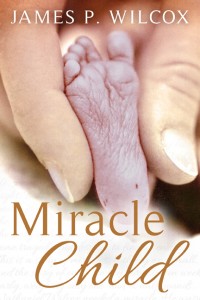I’m thrilled to have author James P. Wilcox join us to discuss his new release, Miracle Child, a true story of miracles, both big and small, and one little boy born sixteen weeks early. Nathaniel Wilcox needed a miracle. He wasn’t expected to make it through the night. His story is a five-month journey to survive. He touched the hearts of everyone who cared for him, and one family managed to overcome tragedy and despair to find a renewed faith in each other and in God. Join me now as I discuss this moving story with James.
Silverberry: The night your wife’s water broke, you had to rush her to the hospital. Was there any warning that might happen? Did you know beforehand that Nathaniel might be premature?
James Wilcox: We had absolutely no warning at all. Mary had been to the obstetrician only a couple of days before this happened, and everything was fine. Nathaniel was our second child, and our first child went full-term with no complications. This was a total and complete shock and surprise for us. We had no warning, no way to prepare, and we operated purely on adrenaline
Silverberry: What were those first three days like?
James Wilcox: Those first three days were the longest and loneliest days of my life. I really didn’t know what was going on, what to expect, or what to do. My wife was on so many medications that she really couldn’t talk and she certainly couldn’t carry on a conversation. Most of the time, I just sat in her hospital room with my overactive imagination dreaming up all the possible “worst-case” scenarios imaginable. At times though, it was extremely hectic as I had to let family, friends, and our respective places of employment know what had happened. It was physically, mentally, and emotionally exhausting.
Silverberry: Nathaniel weighed only 1.8 oz when he was born. He wasn’t expected to make it through the night. What was going through your mind?
James Wilcox: First, I was in complete shock that a child could be so very, very, small, so tiny and fragile. I had never seen a micro-preemie before and had no idea that babies could be born so small. The nurses kept telling me that he was huge for how early he was born (he was twelve-and-three-quarters inches long) and I could only look at them like they were completely crazy. After the initial shock, the only thing I could worry about was getting Nathaniel baptized. I didn’t expect him to make it through the night, so I wanted to make sure that he was baptized before he died. Honestly, I simply couldn’t imagine he could survive as small as he was.
Silverberry: What complications did he face over the next months?
James Wilcox: Nathaniel faced a number of complications over the next five months. The most immediate was his immature lungs. He was put on a ventilator almost immediately after being born, and my wife and I gauged his condition by his ventilator settings. Nathaniel had a total of twelve surgeries while in the neonatal intensive care unit, including abdominal, heart, and eye surgery.
Silverberry: Nathaniel’s struggle to survive, juggling work, visiting him in the hospital, spending time with your oldest child—how did all that affect you?
James Wilcox: I was physically, mentally, and emotional exhausted the entire time. It was so very difficult to balance the needs of my oldest son Ian, Nathaniel’s needs, Mary’s needs, and my own needs with work and everyday life. I did learn a valuable lesson though: it is all right to ask for help when you need it. It is humbling at first to ask for help, it is so much easier to give, then it is to receive, but once I was able to swallow my pride, I found that countless people; family, friends, co-workers, member of our church community, were there to help and support Mary and me through this difficult time
Silverberry: How old is Nathaniel now and what challenges does he face?
James Wilcox: Nathaniel turned ten back in November and one of the miracles of this story is that he has few long-term effects from his extreme prematurity. He does suffer from a pretty significant case of ADHD, which can be traced to his prematurity, and he’s visually-impaired, but other than that, he is just a typical ten-year-old boy.
Silverberry: What was it like to write the book? I imagine it might be a kind of release. On the other hand, it could bring up difficult memories.
James Wilcox: In many ways this was the easiest book I have written to date. As a fiction writer, I have to create characters, develop the story line, manage transitions, and manage the plot. In Miracle Child, I didn’t have to worry about any of that because the story was already “written,” so to speak. At the same time, this is the most difficult thing I have ever done because Miracle Child is such a personal story and it means more to me than any book I have ever written. There were times when I was working on Miracle Child and couldn’t see the computer screen because of the tears in my eyes. It did serve as a release in some ways because I felt a strong call to share this story with others.
Silverberry: Please share some of the joys Nathaniel has brought to your lives?
James Wilcox: Like any parent, my wife and I have taken great joy in all the milestones in his life: the first time he rolled over, sat up, walked, and talked. Really, though, I think the greatest joy I have gotten from this journey is the recognition that I have been given a gift. Nathaniel is a miracle in so many ways and somehow, for some reason, God saw fit to bless my wife and me with this miracle. Since Nathaniel is visually impaired, I find myself constantly trying to figure out how and what he sees. I try to see what he sees, I try to see “the world” through his eyes. I believe that this has made me a more empathetic person because I find myself trying to see “the world” through other peoples’ eyes as well. This empathy, this recognition, and understanding of individual challenges has made me a better teacher, a better husband, a better father, and just a better human. This is the greatest gift I could have been given.
Silverberry: What do you hope the book will provide parents of a premature baby?
James Wilcox: Miracle Child is my son’s story, but it isn’t just the story of a premature child. It is a story of grief, despair, and fear, but it is also the story of love, hope, and faith. What I hope that readers will take away from Miracle Child is that there is hope in every situation. No matter how desperate the situation, no matter how dark the hour, no matter how overwhelming the experience may be; there is always hope. We aren’t always granted the outcome we ask for, but if you are willing to love and can hold on to your faith, your faith in God, in your family, in your doctors, miracles will happen. I firmly believe that God never gives a person more than they can handle. He never asks for more than we are capable of giving, even when we don’t think we have the strength to go on. It is this faith, and the love of my wife, my family, and my friends, of everyone who was involved in this story that allowed me to get through this journey and to recognize this gift for what it truly is: a miracle.
Silverberry: Thank you, James, for sharing your inspiring and moving experience, and for writing Miracle Child. To find more about James, his work, and to purchase his books, follow these links:
James Wilcox’s Website
James Wilcox on Facebook
James Wilcox on Twitter: @m16agenda
Miracle Child available on Amazon:
Kindle Edition: Amazon
Print Edition: Amazon
Miracle Child available at Barnes and Noble:
Author Biography:
James P. Wilcox is the author of Miracle Child, two novels – Sex, Lies, and the Classroom and The M-16 Agenda – and Musings of a Particular Bear: A Poetry Collection. James, a former newspaper photographer and writer, is currently a high school teacher in the Kansas City area, where he lives with his wife and three children.




